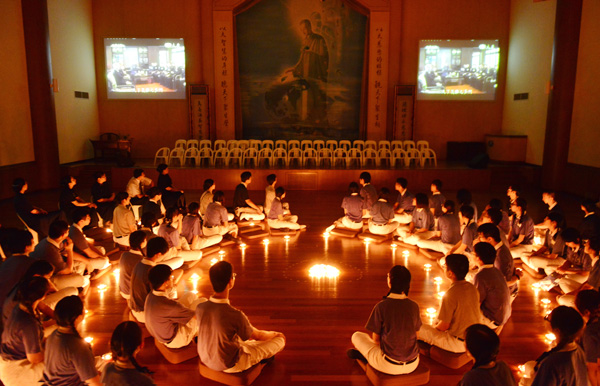
What is the link between a child, a mountain and a set of fast food? Through the game of storytelling, participants exhibited their creativity and imagination, and attempted to string three unrelated pictures together to form a story. (Photo by Pua Phoo Toong)
“How exactly does a meatless meal help the environment?” This is a question one may pose when being told that a plant-based diet is a more earth-friendlier diet.
Well, a meat-free meal can in fact help reduce the releasing of 780 grams of carbon into the atmosphere: that is more than the amount of carbon you cut down by switching off the air-conditioner for an hour. On a compassionate note, you are saving another animal from going through pain and torture.
In March 2011, the Singapore Tzu Chi collegiate youths, or Tzu Chings, initiated a campaign called VERO (short for ‘Veggie Hero’) to promote vegetarianism among young people and create awareness about its carbon reduction benefits.
Almost a year later, the Singapore Tzu Chings were proud to launch the second phase of the campaign, creatively naming it VERO 2.0. On the launching day on 24 March 2012, the organizing committee prepared activities, games and talks that aimed to probe the 53 participants from different tertiary institutions to think on questions like “Is meat dish really a must in our meals when we now have food and resource crises around the world?” and “Is our carnivore preference purely to fulfill our desires and if so, should we let ourselves be driven by desire and turn our heads from the pain and suffering we inflicted on animals?”
Too heavy a message? No worries, as the first item for the day was an ice-breaking game designed for the teams to tap into their creativity and imagination to improvise a story using three unrelated pictures.
One of the groups which was presented with a picture of a child, a mountain, and a set of fast food came up with this “surprising” story: A child is demanding a set of fast food from his father. However, his father replied that there was no fast food available in the middle of the mountain. Suddenly, the father and son witnessed a tiger preying on a rabbit, and it struck the son that eating meat is a very cruel action, hence the son decided to shun meat and be a vegetarian in future.
Through this game, the organizing committee wished to point out to the participants that things seemingly unrelated in life may somewhat be connected. Humans, animals and the nature are in fact interconnected in Earth’s ecology, and if the balance is disrupted, devastating consequences will ensue. One small decision that we make might have a big impact on the planet’s animals and environment. Therefore, we humans must make wise choices – or at least the least impactful choices – each day.
Shocking truths behind meat production
Usually when there were to be a sharing on the topic of vegetarianism, mostly it would be a lecture setting with somebody knowledgeable in the field giving a talk in front with some PowerPoint slides.
The VERO 2.0 organizer instead chose to let the participants feel for themselves the hardship of food-growing and food production. The first part of the game section was to let them experience food and water collection – half of the groups were responsible for transferring water from a common bucket into a plastic bottle by using sponges, while another half was given the task of sorting out five types of beans and grains mixed together in a bowl. Through all the sweat and tears, each of the participants was reminded that the food we consume everyday does not appear out of thin air; it involves a lot of hands and natural resources before it could reach our table.
The highlight of the day was the second part of the game where participants were made to enter an ‘animal farm’. Each team was required to stand on rows of chairs and the first person would have to squeeze through his/her team members in the line and collect bread from them. The bread will then be accumulated on a plate at the end of the line where a sitting member is responsible to consume the bread. After squeezing through their “comrades”, each team member would be made to stand straight up in a small, confined area, waiting to be “slaughtered”. (To make the situation even more real, lights were dimmed and videos with animal cries were played.)
Liong Chee Tzen, who is already a Veggie Hero, admitted that he felt uncomfortable while watching the video. “It was too scary, especially the part when workers remove body parts from the animals.”
Chee Tzen has yet to become a vegetarian because he worried that he would be easily hungry without eating meat, and also what most youths face today – peer pressure. After he saw how animals are being sacrificed for human’s desire, he said that even though he could not become a full vegetarian right away, he would try to cut down on his meat intake and “try to have at least a meatless meal per day”.
“When my group mates and I were cramped together in that small ‘compound’, it was very stuffy and crowded. It was really uncomfortable,” lamented Vero Promoter Tan Hui Earn. The “slaughterhouse” mock-up actually went on for over 20 minutes and most participants, like Hui Earn, were already feeling quite uneasy. Those who were assigned to keep eating at the end of the “fodder” line too seemed to be feeling rather queasy from all the food being “forced down” their throats.
Imagine factory-farmed animals being cramped together their whole lives, living with other dead and diseased animals, and what’s more, on their own excretion. These animals are being force-fed every day, and being treated with hormones and chemicals so that they could be ready for slaughter at a shorter period of time to meet the demands of the human market.
Hui Earn only became a full-time vegetarian a few weeks ago despite having little desire for meat since young. “Seeing how the animals are being tortured, I really regretted not becoming a vegetarian earlier,” she said. Now that she has taken up the role of a Vero Promoter, she tries to influence her friends to go veg by setting an example herself.
“My friends are very supportive of the VERO campaign and although they still find it hard to not eat meat, they think it’s viable to have at least one vegetarian meal per day. I think this is a very good start!”
Indeed it is, and the key to a healthy switch is none other than patience.
“Take gradual steps, or you might get a ‘culture-shock’.” That was Ko Szu Yuan, the Vero in-charge of the JIPOS* group, speaking with the VERO 2.0 participants.
The 18-year-old recounted the three stages he went through while trying to switch to a full vegetarian diet and gave his advice, “Start with not wasting food; make sure you finish everything you order. Then make conscious effort to cut down on meat intake – go from two meat dishes per meal to just one. Finally – and you’re nearing victory – order only dishes you think are of plant origin.”
Nanyang Technological University (NTU) Vero in-charge Pauline too shared her “conversion struggle” with the participants and cited the words from Tzu Chi Singapore CEO David Liu, “Wisdom is turning knowledge into actions” and the encouragement from a fellow Tzu Ching as the push factor for her to set her heart into becoming a full-time vegetarian. After becoming a vegetarian on February 2011, Pauline felt that she has become more compassionate and less temperamental.
“So being a vegetarian is really a good choice,” she concluded. “I hope all of us can promote the cause to our friends around because only with everyone’s strength and support that we could meet our 100,000 vegetarian meals target to help save the planet!”
Cai Yin Kai, a member from the Singapore Vegetarian Society, complimented the way VERO promotes vegetarianism and hoped that his fellow members will also do their part in promoting the green cause.
“Do not belittle every vegetarian meal that we eat, for the accumulated numbers do help in environmental protection and the safeguarding of animal lives.” VERO 2.0 coordinator Liew Zing Quan said in our interview. Looking at how the participants had benefitted from the day’s line-up, activity planning in-charge See Hong Giap was beaming with a satisfied smile and hopes that the participants would be grateful for every meal they have.
As of the end of January 2012, the first phase of VERO campaign has accumulated a total of 17,260 vegetarian meals. The organizing committee hoped that VERO 2.0, which will last from 24 March to 31 December 2012, would bring in more likeminded participants to work towards the 100,000 vegetarian-meal target.
Our Master always says, “Intentions beget blessings, and strong vows beget strengths.” Hopefully the VERO campaign could help local younger generation realize the significance of vegetarianism and together play a part in reducing carbon footprints to save Mother Earth.
*JIPOS: The Singapore Tzu Ching’s abbreviation for ‘Junior College, ITE, Polytechnics, and Others’.

The participants are required to collect as much water as possible using a sponge, hence experiencing that every drip of clean water requires a lot of manpower and processes before it can be served to us. (Photo by Pua Phoo Toong)

Participants busily sorting out a bowl of beans under a limited amount of time. (Photo by Pua Phoo Toong)

Participants experiencing the living conditions of livestock animals and how they are mistreated. (Photo by Pua Phoo Toong)

At the ending point of the ‘animal farm’ station, one participant is “forced” to finish the bread collected, whereas the others are cramped together in a small area to experience the fear of getting killed and the torture of being force-fed. (Photo by Pua Phoo Toong)

Cai Yin Kai, a member from the Singapore Vegetarian Society is very supportive of how VERO promotes vegetarianism and he hopes that the members of Singapore Vegetarian Society will also do their part in promoting vegetarianism. (Photo by Lim Yu Jing)

After watching the video ‘A Day in the Slaughter House’, Liong Chee Tzen said that even though he could not become a vegetarian right away, he will try to cut down on his meat intake and have a vegetarian meal per day. (Photo by Lim Yu Jing)

“Witnessing how the animals are being tortured, I really regretted not being a vegetarian earlier.” Vero Promoter Tan Hui En hopes to do her bit in setting example and getting her friends to go veg with her. (Photo by Lim Yu Jing)

NTU VERO in-charge Pauline shared that she has become more compassionate and less temperamental after being a vegetarian. (Photo by Pua Phoo Toong)



